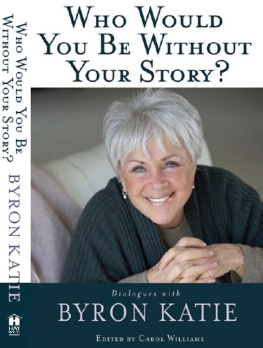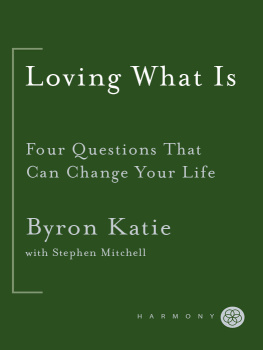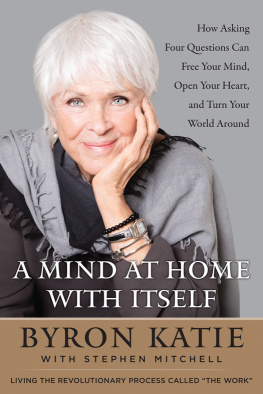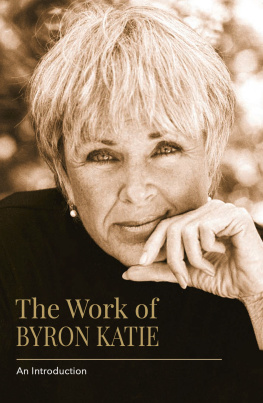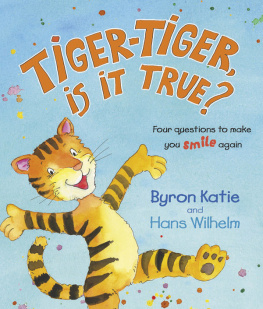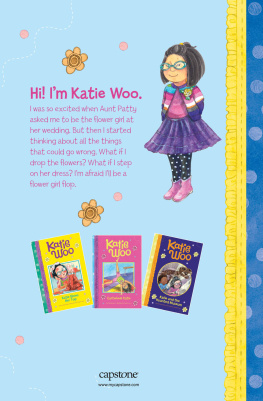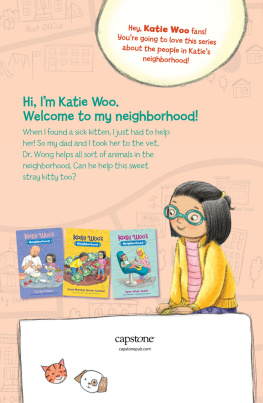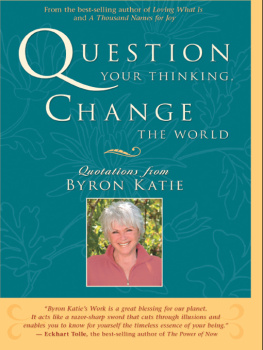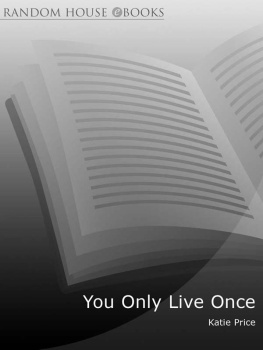WHO WOULD
YOU BE WITHOUT
YOUR STORY?
ALSO BY BYRON KATIE
Loving What Is (with Stephen Mitchell)
I Need Your LoveIs That True? (with Michael Katz)
A Thousand Names for Joy (with Stephen Mitchell)
Question Your Thinking, Change the World:
Quotations from Byron Katie*
*Available from Hay House
Please visit Hay House USA: www.hayhouse.com
Hay House Australia: www.hayhouse.com.au
Hay House UK: www.hayhouse.co.uk
Hay House South Africa: www.hayhouse.co.za
Hay House India: www.hayhouse.co.in
WHO WOULD
YOU BE WITHOUT
YOUR STORY?
Dialogues with
BYRON KATIE
EDITED BY CAROL WILLIAMS

HAY HOUSE, INC.
Carlsbad, California New York City
London Sydney Johannesburg
Vancouver Hong Kong New Delhi
Copyright 2008 by Byron Kathleen Mitchell
Published and distributed in the United States by: Hay House, Inc.: www.hayhouse.com Published and distributed in Australia by: Hay House Australia Pty. Ltd.: www.hayhouse.com.au Published and distributed in the United Kingdom by: Hay House UK, Ltd.: www.hayhouse.co.uk Published and distributed in the Republic of SouthAfrica by: Hay House SA (Pty), Ltd.: www.hayhouse.co.za Distributed in Canada by: Raincoast: www.raincoast.com Published in India by: Hay House Publishers India: www.hayhouse.co.in
Editorial supervision: Jill Kramer Design: Tricia Breidenthal
All rights reserved. No part of this book may be reproduced by any mechanical, photographic, or electronic process, or in the form of a phonographic recording; nor may it be stored in a retrieval system, transmitted, or otherwise be copied for public or private useother than for fair use as brief quotations embodied in articles and reviewswithout prior written permission of the publisher.
The author of this book does not dispense medical advice or prescribe the use of any technique as a form of treatment for physical or medical problems without the advice of a physician, either directly or indirectly. The intent of the author is only to help you in your quest for emotional and spiritual well-being. In the event you use any of the information in this book for yourself, which is your constitutional right, the author and the publisher assume no responsibility for your actions.
Special thanks to Elizabeth Lavine for transcribing these dialogues.
Library of Congress Cataloging-in-Publication Data
Katie, Byron.
Who would you be without your story? : dialogues with Byron Katie / edited by Carol Williams. -- 1st ed.
p. cm.
ISBN 978-1-4019-2179-8 ( tradepaper : alk. paper) 1. Self-actualization (Psychology) 2. Self-evaluation. I. Williams, Carol. II. Title.
BF637.S4K338 2008
158--dc22
2008016186
ISBN: 978-1-4019-2179-8
11 10 09 08 4 3 2 1
1st edition, October 2008
Printed in the United States of America
CONTENTS
DIALOGUES:
Over the past twenty years, Byron Katie has become known around the world as one of the clearest and most inspiring teachers of our time. She teaches a way to happiness, and those who meet her respond instantly to the delight she takes in whoever and whatever is in front of her. Yet, as she is quick to explain, her own teacher was suffering.
Amid the circumstances of what should have been a satisfying life in a California desert townsuccessful business career, healthy children, beautyByron Kathleen Reid (everyone calls her Katie) was overcome by a depression that lasted more than ten years. She kept to her bed in deepening rage and despair. Eventually she committed herself to a shelter for women with eating disorders the only place that would take her health insurance. One day she woke up in her attic room to find that all her suffering was gone, replaced by a joy that was unlike anything she had ever known:
I discovered that when I believed my thoughts, I suffered, but that when I didnt believe them, I didnt suffer, and that this is true for every human being. Freedom is as simple as that. I found that suffering is optional. I found a joy within me that has never disappeared, not for a single moment. That joy is in everyone, always.
The difference between her experience and other experiences of spiritual opening is that in the moment of waking up, she discovered a method of sustaining that extraordinary lightness. The four questions and turnaround that she later called The Work were already present in that first moment.
Katie knew that the joyous clarity she was experiencing is available to everyone. And, in her down-to-earth American way, she began to share her method of self-inquiry with the many people who were immediately drawn to her. Katies primary realization was that every painful feelinganger, loneliness, fearis the result of believing a thought that isnt true. To notice what that thought is and then to examine it with the questions that Katie discovered has an unimaginable powerunimaginable until you do it for yourself.
To do The Work, alone or with others, you begin by finding the particular thoughts that are causing you stress. Perhaps one thought is: My husband doesnt love me. You write the thoughts down on what is called a Worksheet (see the Appendix of this book for more information), then examine the thought using these four questions:
Is it true?
Can you absolutely know that its true?
How do you react when you believe that thought?
Who would you be without the thought?
After this, you turn the thought around to its several oppositesfor example, My husband does love me, I dont love my husband, and I dont love myselfand you find three genuine examples of how each turnaround is as true as or truer than the original thought.
The conversations in this book show the kinds of things that happen when people who are suffering answer these questions, slowly and accurately. They are edited dialogues between Katie and fifteen participants at various public workshops and Schools for The Work that took place around the United States and in Eu-rope. Some of the participants had painful illnesses; others were lovelorn or in messy divorces; some were simply irritated with a co-worker or worried about a rent increase. What they all had in common was a willingness to question, with Katies help, the painful thoughts that they came to see were the true cause of their suffering.
The dialogues arent organized by their ostensible topics family, illness, and so onbecause the real subject here is the pro-cess of The Work and the various paths it can take. Some of the participants were new to The Work, while others had been practicing it for some time but had hit particular walls. In every case, we see how Katies acute mind and fierce kindness helped each person dismantle for themselves what was felt to be unshakeable reality.
Although these dialogues make fascinating readingsome are both hilarious and deeply moving at oncethey are intended primarily as teaching tools. Each took place in front of an audience. Katie never lost her connection with that audience, repeatedly re-minding each person in the room to follow the dialogues inwardly and to ask themselves the questions the participant must ask.
This is the way this book should be read to be most useful. The dialogues between Katie and these volunteers is an external enactment of precisely the kind of dialogue each reader can have with his or her own thoughts. The result, even in the seemingly direst situation, can be an unimagined freedom and joy.
Two Things to Know Before You Begin Reading
Each participant in the dialogue has been given a copy of Ka-ties Worksheet to fill out before the workshop begins. (There is also a copy of it in the Appendix at the back of this book; you are encouraged to look at it and use it yourself.) The Worksheet which asks questions such as Who angers, frustrates, disappoints, or confuses you, and why? What is it about them that you dont like?helps identify and pin down the thoughts that are the causes of suffering. Usually the conversation begins with the participant reading from the Worksheet, and they return to it again throughout the conversation. In this book, each time a participant reads from the Worksheet, their words appear in italics. This is to make the process clear.
Next page
